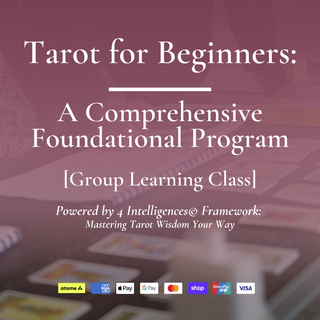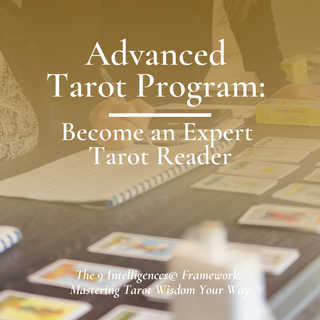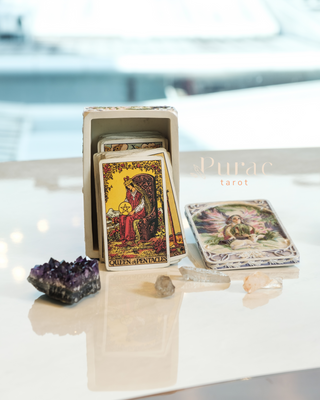If you’ve been learning Tarot on your own - whether through books, YouTube, or even using AI tools like ChatGPT - you’ve probably run into some of these struggles:
- Interpreting a Tarot spread on your own, without relying on ChatGPT
- Making sense of a single card in real-life, emotional terms
- Reading a 3-card spread for someone else (especially past, present, future)
- Staying motivated and consistent in your learning
- Feeling emotionally dependent on the cards or unable to step away
- Worrying about being judged by society, communities or even family
Let’s break these down, one by one.
1. Reading a Spread Without Relying on ChatGPT
Let’s be honest - AI tools like ChatGPT and sites like BiddyTarot can be helpful when you're stuck. They give you quick definitions, fresh angles, or alternative meanings. Great. But over time, constantly turning to them can actually weaken the most important muscle in Tarot: your own ability to think critically and interpret intuitively.
Most people don’t realise this right away. The temptation for fast answers is strong, especially when you're still learning. But Tarot isn’t meant to be spoon-fed. This is a symbolic language that takes time to build fluency in. You can't outsource real understanding.
And don’t be fooled by how Tarot is often portrayed in media - crystal balls, fortune-tellers, or dramatic one-liners. In truth, Tarot is a deeply intelligent and emotionally tuned art form. When learned ethically and practiced with integrity, it becomes a powerful tool for healing, clarity, and emotional insight - especially in situations where logic alone isn’t enough.
If you’re serious about becoming a consultant, what you really need isn’t more AI-generated interpretations. You need a human mentor - someone who’s put in the hours (10,000 and more), who can challenge your assumptions, ask the questions you’re avoiding, and walk alongside you as you develop both skill and self-awareness.
And yes - there’s science behind why this works.
Real-life, face-to-face learning lights up the brain in ways that digital tools can’t.
Human interaction boosts key brain chemicals like dopamine, serotonin, oxytocin, and endorphins - all of which enhance motivation, memory, emotional safety, and deeper learning.
That’s what helps you grow. Not just more knowledge - but real, integrated confidence.
Brain Chemicals That Drive Motivation & Learning (Driven by Human Interactions)
(As backed by neuroscience)
|
Neurotransmitter / Hormone |
Role in Learning |
What Triggers It |
|
Dopamine |
Motivation, reward, reinforcement |
Novelty, progress, encouragement |
|
Serotonin |
Confidence, emotional regulation, memory |
Social connection, feeling valued |
|
Oxytocin |
Trust, bonding, emotional safety |
Human contact, rapport |
|
Endorphins |
Calm, pleasure, resilience |
Laughter, movement, feeling supported |
|
Norepinephrine |
Focus, alertness |
Healthy stress, real-world engagement |
|
Acetylcholine |
Deep focus, memory formation |
Attention, presence |
|
Glutamate |
Learning & brain plasticity |
Active thinking and processing |
|
GABA |
Calm and emotional regulation |
Safe, grounded learning environments |
|
Cortisol (small doses) |
Sharper focus under pressure |
Timelines, challenges |
|
BDNF (Brain-Derived Neurotrophic Factor) |
Brain growth, long-term learning |
Feedback, meaningful connection |
📚 Scientific sources:
- Lieberman, M.D. (2013). Social: Why Our Brains Are Wired to Connect
- Kandel, E.R. et al. (2013). Principles of Neural Science
- Immordino-Yang, M.H. & Damasio, A. (2007). Mind, Brain, and Education
2. Struggling to Connect One Card to a Real-Life Situation
Sometimes it’s not the spread that confuses you - it’s just one card. You know what the book says, but you can’t quite relate it to what’s happening in your life. You hesitate. You overthink. Or the card makes sense logically, but emotionally, it doesn’t land.
This happens when we haven’t learned how to feel clearly. There’s a quote I often come back to:
“We feel, therefore we learn.”
- Immordino -Yang & Damasio
At Purac Soul, this is one of our core principles. You can't interpret a card meaningfully if you’re disconnected from your emotional state - whether that’s your own, your client’s, or someone else’s.
This is where real Tarot training begins: learning how to sit with your feelings without drowning in them. We teach you how to separate noise from signal, how to recognise when something is emotional reactivity versus true intuitive insight.
Once you get this, everything shifts. Your confidence grows. Your readings make more sense. And even a single card becomes enough to open a whole conversation or breakthrough - without second-guessing.
3. Struggling With 3-Card Spreads (Especially for Others)
Reading for yourself is one thing. You already know what happened, how you feel about it, and who’s involved. But when you’re reading for someone else - especially using a 3-card past, present, and future spread - it’s a different ball game. You’re working with limited context, and often very little emotional clarity from the other person.
A lot of learners stumble here. They draw the cards, see the meanings, but can’t quite pull the story together. The flow stops. They second-guess themselves or feel unsure about what to say.
This happens not because they don’t know the cards, but because they haven’t developed the skill of narrative sensing - the ability to read what’s in between the cards, to spot emotional patterns, and to connect the dots across time. That skill doesn’t come from reading more books. It comes from real-life practice, good mentorship, and learning how to listen and respond in the moment.
4. Lack of Motivation & Consistency in Learning
Most people don’t talk about this part, but it’s real: when you learn Tarot on your own, it’s easy to lose steam. You start strong, feel inspired for a while, then life gets in the way. The cards sit in a drawer. Your journal stays empty. You lose momentum.
This isn’t because you’re lazy or undisciplined. It’s because motivation isn’t something you can force. It needs structure, social interaction, and a sense of real progress. Otherwise, your brain just tunes out.
That’s why the way you learn matters. When there’s a mentor guiding you, when there are peers to practise with, when your insights are witnessed and challenged in real time - the learning sticks. You don’t have to keep restarting from scratch. You build confidence, naturally. And over time, your motivation takes care of itself, because you're actually seeing results.
5. Obsession or Dependency on Tarot Cards
There are times when the cards feel like a lifeline. One reading leads to another, and then another. You keep pulling clarifiers, hoping something will finally click. Before you know it, you're asking the deck about every small decision - what to text, whether to go out, what someone meant by a sentence.
This isn’t rare. It often happens during periods of emotional overwhelm or when life feels out of control. But if you're not careful, the cards can shift from being a source of clarity to something you use just to soothe anxiety.
At some point, it's worth asking yourself: Am I using Tarot to gain insight - or to avoid sitting with discomfort?
A healthy Tarot practice is built on intention. It’s rooted in learning, reflection, and asking better questions - not just any question. Over time, you begin to understand your subconscious more clearly. You start recognising patterns. And with practice, you learn how to pause and check in with yourself before reaching for the deck.
This is what we call self-awareness - and it’s one of the most highly sought-after soft skills in the workplace today, especially for leaders (refer to source below).
That’s when Tarot becomes powerful. Not as a crutch, but as a mirror. Not something you lean on constantly, but something you turn to when you want to see more deeply.
This is the kind of relationship we help our students build - one that empowers, not entangles. Where your intuition grows stronger, not more dependent. Where you can still use the cards - but no longer need them to feel okay.
Source: Harvard Business Review (HBR) - Tasha Eurich (2018). What Self-Awareness Really Is (and How to Cultivate It).
6. Fear of Being Judged by Society, Communities, or Family
Not everyone understands Tarot. In some families or cultures, it’s still seen as strange, suspicious, or just something to joke about. Many readers keep their learning quiet - not because they doubt the cards, but because they’re afraid of how others might react.
This fear is real and understandable. It takes strength and courage to pursue something others might not understand or approve of.
But over time, there’s also a quiet shift that happens. The more grounded you are in your own practice, the less you feel the need to explain or defend it. You’re not here to convince anyone. You’re here to help - and to learn how to hold space for others with clarity and care.
That’s part of what it means to grow into a Tarot consultant. You learn how to speak about your work in a way that feels honest and steady. When you speak, you need to communicate with elegance and thoughtfulness. When you describe Tarot as a tool for insight, emotional understanding, or decision-making, people tend to listen. Some may stay sceptical. Others may become curious. But either way - your confidence, not their opinion, sets the tone.
And here’s what really shifts it: the moment you help someone. When a reading brings someone comfort, clarity, or even just a sense that they’re not alone - it changes things. People who once questioned your path begin to see the value in it. THIS WILL HAPPEN as you sharpen your tarot skills and begin to heal others.
That’s what you focus on. That’s what matters.
At Purac Soul, we encourage our students to deepen their practice - not just in Tarot, but in any area that strengthens their ability to support others. If you're drawn to relationships, consider taking a basic counselling course. If you're interested in business Tarot, go study the foundations of business. This is how you build credibility. This is how you niche with confidence - by combining your intuition with real-world knowledge that serves your clients well.
Yours Truly,
Jean T.
Founder & Tarot Educator
Learn the foundation of tarot here.

-
Notice to Businesses Regarding Content Misuse
At Purac Soul, we invest significant time, expertise, and original thought into creating all of our educational materials, written content, course frameworks, brand voice, and client experiences. Every word, process, and insight reflect years of lived practice, research, and our unique teaching approach.
We are aware that some competitors in the field have used or repurposed our content - either in part or in concept - without credit or permission. This includes duplicating written phrases, course structures, learning language, or proprietary metaphors unique to Purac Soul.
Please be advised that we take intellectual property seriously. We use tracking and detection tools to monitor content duplication across websites, learning platforms, and social media. If we find any instances where our content has been used without acknowledgment or license, we reserve the right to formally challenge and pursue action where appropriate.
If you are inspired by our work, we encourage you to create your own original voice and learning materials - just as we have. We are proud of the integrity we bring to this field, and we expect the same respect from those who call themselves fellow educators or practitioners.
Let’s raise the standard in this industry by creating, not copying.






![Online Tarot Tuition [One-To-One]](http://www.puracsoul.com/cdn/shop/files/TarotTuition.png?v=1727723718&width=320)
![Tarot For Beginners: A Comprehensive Foundation Program 6G [Private 1-1 Learning]](http://www.puracsoul.com/cdn/shop/files/6GCourse1-1_f313bb89-cb26-4da0-af5e-f4e49644f572.png?v=1736078063&width=320)




